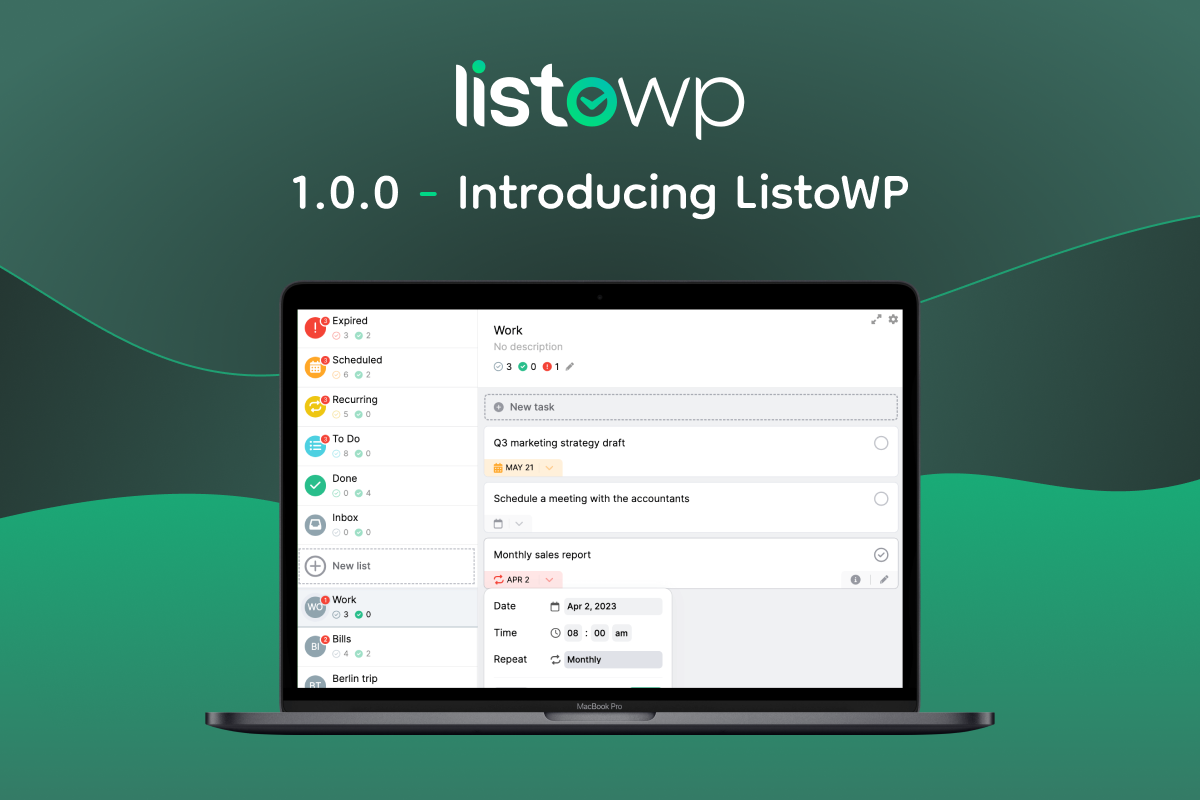ListoWP 1.0.0 is out after several months of development and testing – and we couldn’t be more excited!
What is ListoWP?
In short, ListoWP is a To-Do & Reminders plugin for WordPress. It lets you and all your users privately manage their Tasks and Lists, set deadlines, and even have recurring Tasks. It features several Smart Lists that automatically collect Tasks based on their status, due dates, recurrence rules, etc.
What are the features?
Since ListoWP is a young project, and we have tons of ideas for it, the list below will probably quickly become outdated.
- We invite you to go through our always-up-to-date Features Page, which describes the key concepts with screenshots.
- You are very welcome to experiment with the ListoWP Demo (also available in dark mode).
- For an in-depth look, please refer to ListoWP Documentation.
At present, ListoWP features Tasks with optional deadlines and recurrence rules, organized in Custom & Smart Lists. Both Tasks and Custom Lists can be easily managed with drag-and-drop. The interface is both powerful and intuitive, with a great mobile experience and fullscreen mode.
ListoWP is integrated with PeepSo, BuddyBoss, and WooCommerce – when enabled, it adds a tab in user profiles of these plugins, with the Lists & Tasks baked right in.
We have also added an optional GDPR (and similar) compliance mode which lets users delete and export all their ListoWP data in a couple of clicks.
How can it be used?
To-Do and Reminders apps in general are tools designed to improve productivity, and that’s how we see ListoWP – primarily as a productivity tool. It can help you stay organized without the need to leave your own WordPress site.
The most common usage scenario we think of when building this plugin was managing the WordPress website itself. Or any other project or business. For example, I personally use it as my work to-do list. I have one list to plan the marketing strategy, and another to take notes for blog posts & plan my content. I also use it as a general reminder system, for example for recurring tasks like “send affiliate payouts” or “pay salaries”.
Another example would be an online community. If you are running one (with a plugin like PeepSo or BuddyBoss), your users might definitely find it useful.
But like most tools, ListoWP will adapt to your ideas – it’s a blank canvas for you and your website members. Planning a trip? Check! Need to remember your anniversary? Check! Want to be reminded about a meeting? Check!
What is the development roadmap?
Our primary focus going forward will be an email notification system, so that expired (and almost expired) Tasks can be sent to you even if you’re not on the website itself. Further down the road, we plan to add a block with tasks summary (to-do, expired, etc.) to be placed in a sidebar – to provide an overview of your Tasks on any page, not just the ListoWP main page.
Later on, we plan to focus on team-based experience through shared Boards, task assignments, perhaps even comments, etc.
However, a lot will depend on your feedback to us – as we strive to build a plugin that best serves the users, we might choose to prioritize other ideas depending on how frequently requested they are. We are happy to receive suggestions for features, improvements and even bug reports (we don’t expect many of these!) through the ListoWP community and support tickets.
How is it different from other solutions?
Most importantly, there just aren’t many To-Do managers for WordPress at all. If there are, they are either purely Administrators focused, or shun the potential of letting users build their own Lists. There are, of course, thousands of apps for mobile and desktop, but as far as we found out in our research, there wasn’t anything like ListoWP for WordPress out there.
In opposition to most WordPress solutions in the market, everything in ListoWP (except stricte plugin configuration) happens in the front-end. It means your users will never have to enter the WP Admin area to manage their content. They don’t even have to be aware your website is running WordPress.
To further set itself apart from the common WordPress solutions, ListoWP is built 100% on custom database tables, to avoid clutter in the WP Posts tables and slowing down other parts of the website. Custom Post Types architecture is easy for the developers to start with, and thus is prevalent in the WordPress universe. But with complex solutions and/or plugins based heavily on user input, it can lead to many issues later on. The developers are then either doomed to perform never-ending optimization or go through a painful process of refactoring and migrating data to custom tables. I have seen the problem firsthand with Easy Digital Downloads, creating millions of entries in our WP Posts tables. Fortunately, the developers already migrated to a custom database structure. We have avoided this iceberg completely, by designing our own database structure from the get-go.
When planning the architecture, we also went with a mobile-first mindset, building everything on REST APIs. This will allow us to create native mobile apps for ListoWP in the future – if the market demand is there.

